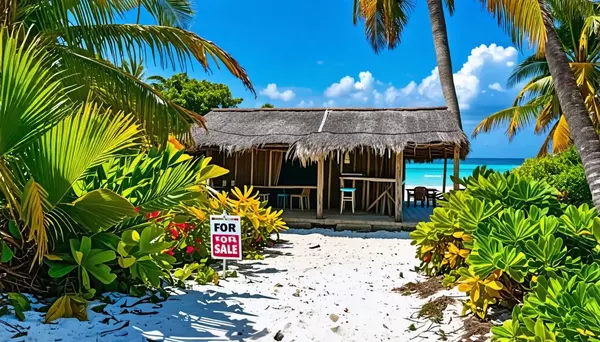Everything You Need to Know About Taxes and Fees in Real Estate In The Dominican Republic

Buying a house in the Dominican Republic comes with its own set of challenges. Did you know that property tax there is 1% per year on the cadastral value? This article will guide you through understanding taxes and fees on real estate to make your investment smoother.
Ready to learn more?
Key Takeaways
- In the Dominican Republic, property valued above a certain threshold faces a 1% tax each year. This helps keep investments appealing by not taxing entry-level properties.
- Rental income gets taxed too, at different rates for residents and non-residents. Residents pay 15%, while non-residents pay 27%. Plus, there's a rule where 10% of rent has to be sent directly to the authorities.
- Buying real estate involves extra fees like community costs for shared space upkeep and advertising expenses for selling your place.
- Understanding local laws is crucial to avoid issues with titles and ownership rights when buying property in the Dominican Republic.
- Using tax exemptions, understanding capital gains taxes, and deducting investment - related expenses can help save money on taxes.
Breakdown of Property Taxes in the Dominican Republic
In the Dominican Republic, owning a home means you'll pay property taxes. These taxes depend on how much your house is worth.
Property Tax Rates
Delving into the property tax rates in the Dominican Republic, investors find a clear framework guiding their financial obligations. This portion is vital for making informed decisions in the real estate market.
| Property Value | Annual Property Tax Rate |
|---|---|
| Up to a certain threshold | 0% |
| Above the threshold | 1% of the cadastral value |
The Dominican Republic sets a zero tax rate for properties valued up to a defined threshold. It encourages buyers by making entry-level investments more appealing. For properties exceeding this value, the state imposes a 1% tax. This tax applies to the cadastral, or record, value of the property. It's a method to ensure fairness in the financial contributions from property owners.
For non-residents, the country has a different approach for rental incomes. They face a 27% tax rate on what they earn from renting out their real estate. This distinction highlights the need for strategic planning. It affects how non-residents manage and invest in Dominican properties.
Understanding these rates is crucial. It helps investors calculate potential expenses and returns. This knowledge supports smarter, more profitable investment decisions in the vibrant Dominican real estate market.
Property Tax on Rental Income
In the Dominican Republic, the government taxes rental earnings from properties. If you own property and rent it out, you need to pay a share of what you make to the government. The rate varies depending on whether you live in the country or not.
Residents pay less, only 15% of their rental income as tax. Non-residents have to give up more, specifically 27%. On top of that, there's another rule where renters or those managing your property must hold back 10% of what they owe you and send it directly to the authorities as tax.
This means keeping track of all money made from renting out your place is crucial. You'll need this information for filing an accurate income record with Dirección General de Impuestos Internos (DGII).
They handle taxes related to property earnings among other duties in the Dominican Republic. Don't forget about depreciation either; it can reduce how much tax you owe by lowering your net annual income figure.
This way, understanding these rules can help manage how much goes towards taxes and possibly keep more money in your pocket.
Understanding Additional Real Estate Fees
When you buy property, you face more fees than just the price tag. These include money for community upkeep and advertising your rental.
Community Fees and Advertising Costs
Owners of properties pay community fees for the upkeep of shared spaces. These costs include cleaning common areas and maintaining pools or gardens. The amount you pay depends on where your property is and what type it is.
Advertising expenses cover getting the word out about your house that's up for sale. This might mean paying for professional photos or listing your place online. Like community fees, these costs can change based on how you choose to market your property.
It's vital to plan for these expenses in your budget when buying a house.
Maintenance and Repair Considerations
Keeping your property in good shape is key. Regular upkeep and fixes help keep its value up and make it nice to live in. You may face surprise repair costs, especially with older homes needing more care.
Set aside money for these tasks to avoid big headaches later. Property management firms can handle these jobs for you, making life easier if you're not around.
Next, understand the risks of owning property here before taking the plunge.
Risks of Buying Property in the Dominican Republic
Buying property in the Dominican Republic can be tricky. People from other countries may not know all the local laws and rules. This can lead to problems with titles and ownership rights.
A buyer must make sure that the seller truly owns the property and has the right to sell it. Title searches are critical here. They help discover any issues or claims against the property.
Another risk involves taxes on real estate investments, including rental income. Non-residents pay a 27% tax rate on this income, which is quite high compared to some places. Understanding these tax demands is vital for anyone looking to invest in real estate within this nation.
Due diligence is not just a process, but a shield against potential investment pitfalls.
Strategies for Tax Efficiency in Real Estate Investments
Making smart moves with your real estate investments in the Dominican Republic can save you money. Tax laws and incentives are key to boosting your profits. Here are practical strategies for tax efficiency:
- Use tax exemptions to your advantage. In the Dominican Republic, some properties get a break from real estate tax. Find out which ones qualify and aim for those to reduce what you owe.
- Understand capital gains taxes. When you sell property for more than you bought it, this profit faces taxes. Yet, certain rules may lower the amount taxed. Learn these rules well.
- Deduct expenses related to your investment property. Costs like repairs, advertising, and maintenance can lower your taxable income. Keep good records of these expenses.
- Consider setting up a corporation for holding property. This move might offer benefits like better tax rates and easier management of assets and liabilities.
- Explore trusts as a way to manage your properties. Trusts can help in efficiently passing real estate to heirs or managing rental income, possibly offering tax benefits as well.
- Check if double taxation treaties apply to you. The Dominican Republic has agreements with some countries that prevent taxing income twice — once in each country.
- Regularly review your estate plan with an expert in local law and international scenarios, especially if you're not a resident there but own property.
- Maximize depreciation deductions by understanding how they work in the Dominican Republic's context, including what's considered the salvage value of your property.
- File everything correctly and on time regarding taxes owed on rental income if you rent out property here, avoiding penalties and interest on late payments.
- Tax - efficient financing options should be explored too, including how mortgages affect your taxable income and whether any credits are available to reduce what's owed annually.
Conclusion
Property taxes and fees in the Dominican Republic can seem complex. This guide helped break them down into simple parts. It showed how to manage costs like the property tax on rental income and transfer tax when buying real estate.
We also covered extra expenses such as community fees and maintenance costs. Knowing these details helps you save money and make smarter investment choices.
Did this guide make understanding taxes easier for you? Think about using these tips to lower your tax bills. Experts recommend consulting a taxation consultant for personalized advice, especially useful for big investments or if you are new to investing in the Dominican Republic.
They can help with complicated stuff like estate planning too.
Investing wisely means paying attention to all possible costs, including taxes and fees that might not be obvious at first. By keeping informed, investors can find profitable opportunities without unwanted surprises.
Always stay prepared and informed about changes in tax laws that could affect your investments here. A little effort now pays off big later.
Ready to tackle real estate investment with confidence? Remember, every successful investor started somewhere - why not start today?
FAQs
1. What taxes do I need to pay when buying a house in the Dominican Republic?
When you buy a home, you pay a property transfer tax and an appraisal fee. The government sets these costs based on your home's market value.
2. How much is the income tax for homeowners in the Dominican Republic?
Homeowners might pay different amounts of income tax. It depends on how much money they make each year. Some people also get tax deductions that lower their taxes.
3. Do I have to worry about inheritance taxes if I own property in the Dominican Republic?
Yes, there are inheritance taxes here. An estate planner can help figure out these costs after someone passes away.
4. Can owning real estate affect my other taxes?
Owning real estate can change your income taxes and sometimes add other fees like wealth tax or corporation tax if you own through an LLC.
5. What is Impuesto sobre la Propiedad Inmobiliaria (IPI)?
IPI is a special kind of tax for properties valued over a certain amount, not counting your main home up to that limit.
6. Are there any protections or services for my property transactions in the Dominican Republic?
Yes! Title insurance protects against problems with your property's legal status, and escrow agents help manage money safely during sales.
Categories
- All Blogs (61)
- agent (1)
- branded residence (1)
- business (2)
- buy (2)
- buying (23)
- cabarete (1)
- cap cana (6)
- caribbean (2)
- casa de campo (6)
- celebrity (2)
- commercial (1)
- construction (2)
- dominican republic (9)
- evaluation (1)
- event (1)
- financing (1)
- golf (2)
- golf resorts (2)
- Grupo De Vale (1)
- hotel (1)
- insurance (1)
- investing (26)
- las terrenas (1)
- law (3)
- lawyer (1)
- legal (1)
- luxury (1)
- market (1)
- north coast (2)
- properties (7)
- property inspection (1)
- property tax (1)
- puerto plata (1)
- punta cana (3)
- real esate (1)
- real estate (33)
- renting (5)
- resorts (1)
- selling (5)
- selling, (1)
- tax (3)
- usa (1)
- vacation rental (2)
Recent Posts










GET MORE INFORMATION NOW

